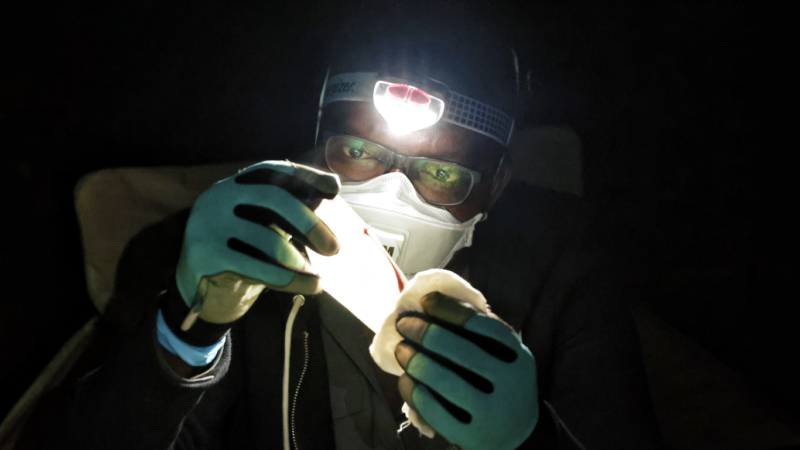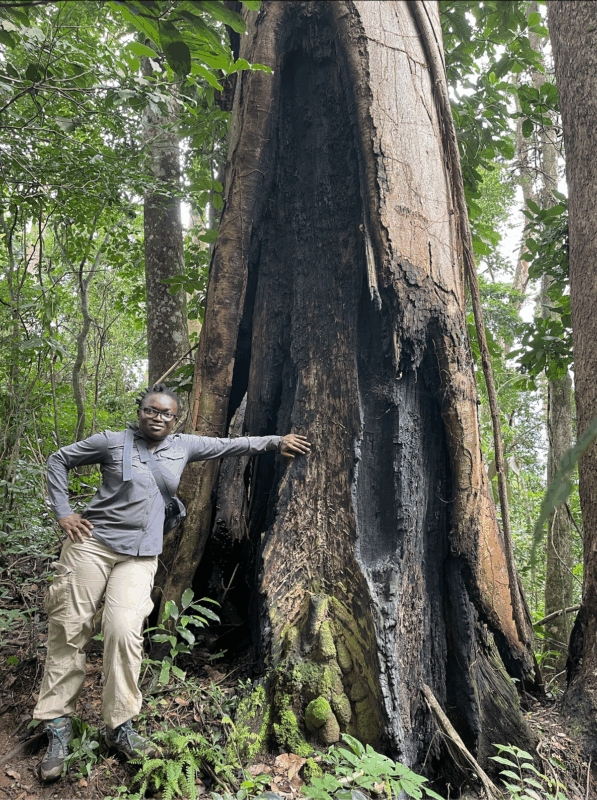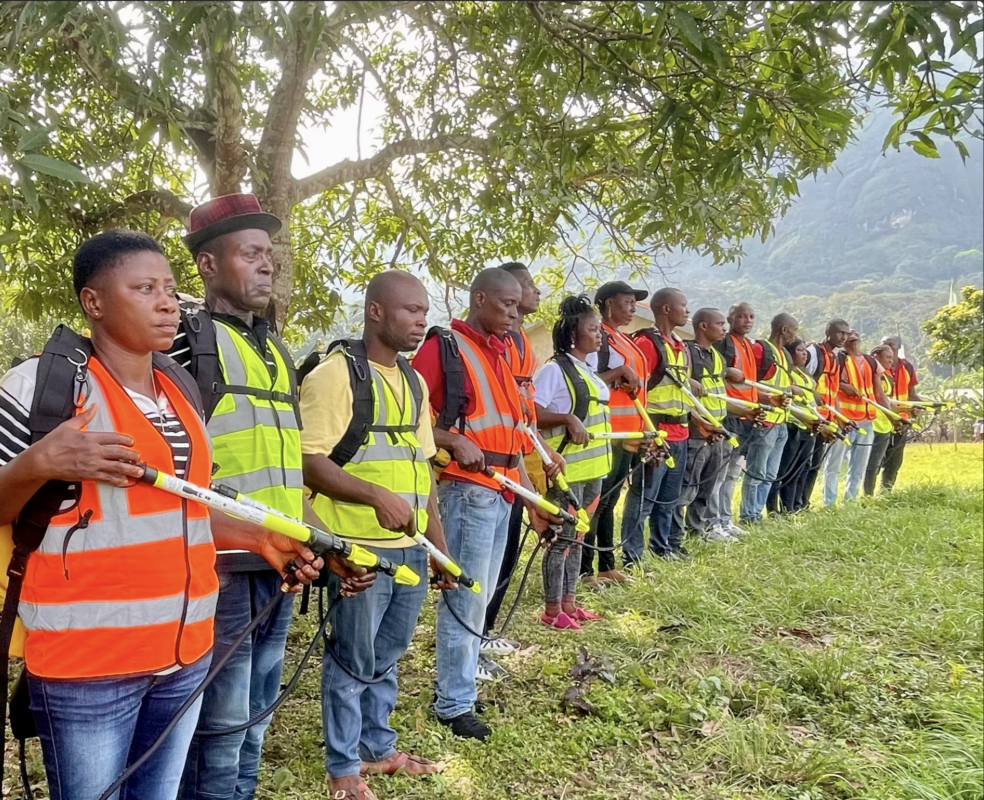
climate change, nature & conservation, sustainable business
Fireproofing Nigeria’s Last Primary Forest and Solving Planetary Crises
by 2023 Pritzker Award Finalist Iroro Tanshi
Our world is on fire. Australia, Europe, Canada, California, and even my homeland, Nigeria and West Africa — all are witnessing climate-enabled wildfires that destroy lives and nature.
13,000 years ago, human-caused wildfires, exacerbated by climate change drove megafauna extinct in California – is history repeating itself? Biodiversity loss, climate change and emerging zoonotic diseases like the COVID-19 pandemic showed that human survival is connected to a healthy planet.
My conservation interest started with bats and forests, but I had to overcome resistance. When I first shared my bat and forest protection goals with my family, my father, who raised me on nature documentaries, surprised me with his response: “You’re not a forest woman. Africans are too hungry to do conservation. We don’t have any forest left, let alone government interest in protection.” I will convince the government, I replied. He smiled at my “naivety,” and I remembered him agonizing over my grandmother’s farm that she lost to oil exploration. Upon discovering oil, the Nigerian government takes the land.
Like most parents in the oil-rich Niger Delta, my father hoped that I would work in the petroleum industry and was disappointed with my choice of conservation — a less lucrative career. His sentiments are shared by most Nigerians, despite the damage that has been done to our natural beauty by the oil industry. Being a woman in a male dominated field also meant that I always had to convince people that I could lead conservation initiatives. But societal acceptance be damned, I had fallen in love with bats during a field course in 2010 and I was unstoppable.
I broadened my focus from bat conservation to forest protection in 2016 when my team rediscovered the rare endangered Short-tailed roundleaf bat. It had not been seen for 45 years and was feared extinct, currently estimated at less than 1,500 individuals. A mere 10 days after that life-altering discovery, my team had to flee from wildfires on Afi Mountain Wildlife Sanctuary, one of the twin forests that preserves Nigeria’s last primary forest. Without advanced firefighting tools, and steep mountain slopes to contend with, local communities were helpless as the fires blazed through approximately 5,000 hectares of forest and many farms, burning for three weeks until the first rains arrived.

Awakened by that fire, I co-founded a non-profit called Small Mammal Conservation Organization (SMACON) to draw attention to the silent extinction and unique habitat needs of small-sized mammals that are often neglected by conservation programs in favor of charismatic megafauna such as elephants or gorillas. In the twin forests covering a combined area of 75,000 hectares, wildfires are climate-driven human-caused events, occurring when farmers slash and burn forests or burn farms to clear and condition the soil for each planting season.
The solution? Fireproof the forest through a technology-driven, early-warning wildfire prediction and prevention program that stops fires on farms before they reach forest. Co-developed with community members, we launched a 50-person fire ranger force — Forest Guardians — that deploy remote firefighting equipment to stop wildfires when they happen. Other than the pandemic year of 2020, we have recorded zero wildfires since 2017. In addition to protecting forests, the program also shields farms from wildfires, serving over 5,000 small-holder farms. In the 2023 fire season alone, Forest Guardians prevented 33 wildfire events on farms.
Across the 19-million-hectare Lower Guinean Forest, Africa’s most ecologically diverse rainforest landscape, there are about 150 forest reserves. These have become abandoned paper parks or on the brink of ecological collapse, plagued by human-caused annual wildfires. Restored and made fireproof, these forests will save biodiversity, safeguarding local livelihoods for 3-5 million smallholder farmers, absorbing approximately 72 million tonnes of carbon per year, and reducing the risk of zoonotic diseases. I am committed to scaling up our successful wildfire prevention program across the Lower Guinean Forest.

The solution must start locally, which is impossible when intervention programs ignore culture or local needs, failing to recognize people’s agency to act. Local agency drives behavior change and accelerates self-sustaining cultural shifts by eliminating the expediency of awareness programs without tools, enforcement without respect for culture. Our partnership with local communities also reduces bat hunting and consumption, and thus zoonotic disease risk, which together with forest protection for biodiversity and climate, addresses earth’s three biggest interconnected planetary scale issues.
Our success results from collaborating with and coordinating enthusiastic and dedicated individuals to preserve primary forests and, on a regional scale, empowering career scientists and conservation practitioners throughout West Africa. I lead the recently launched West Africa Mammal Partnership — a network of planetary health experts who are committed to conservation science and building capacity to bend the curve of biodiversity loss while mitigating climate change and zoonotic disease risk.
Finally, local perceptions are evolving, renewing hope for younger conservationists and the future of this spinning blue ball we call home. Through receiving multiple prestigious international awards, leading a thriving NGO, engaging the government, and driving regional and international initiatives, I have convinced my father and many Nigerians that protecting forests and our incredible biodiversity is an outstanding, exceptional, and excellent profession that will save our planet.
This essay is written by a 2023 Pritzker Emerging Environmental Genius Award finalist. This year’s winner will be named on October 26.
